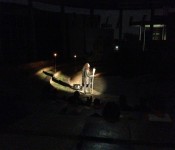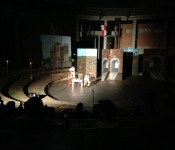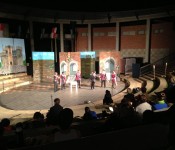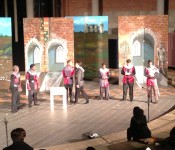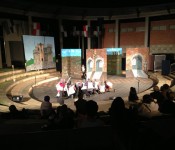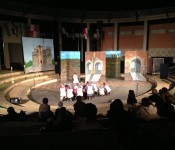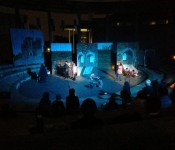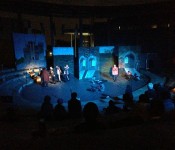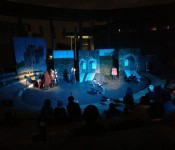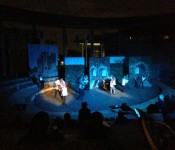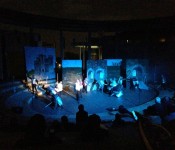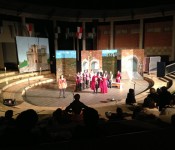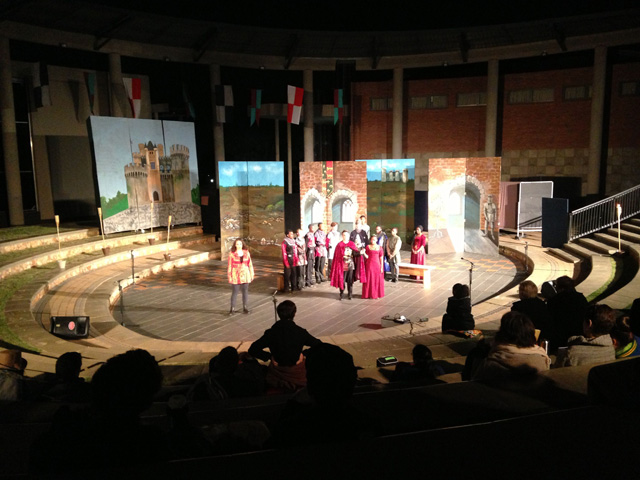
Rustenburg Henry V Review
Danie Flemming and Antonie Potgieter from Rusties went to the first evening of Henry V that was performed at the Lebone II College of the Royal Bafokeng. The play was performed at the amphitheater.
For the people not familiar with the play, here is just a brief overview of the play, if you are planning to visit Lebone II. The play is set in England in the early fifteenth century. The political situation in England is tense: King Henry IV has died, and his son, the young King Henry V, has just assumed the throne. Furthermore, in order to gain the respect of the English people and the court, Henry must live down his wild adolescent past, when he used to consort with thieves and drunkards at the Boar’s Head Tavern on the seedy side of London.
Henry lays claim to certain parts of France, based on his distant roots in the French royal family and on a very technical interpretation of ancient land laws. When the young prince, or Dauphin, of France sends Henry an insulting message in response to these claims, Henry decides to invade France. Supported by the English noblemen and clergy, Henry gathers his troops for war.
Henry’s decision to invade France trickles down to affect the common people he rules. In the Boar’s Head Tavern in Eastcheap, some of the king’s former friends—whom he rejected when he rose to the throne—prepare to leave their homes and families. Bardolph, Pistol, and Nim are common lowlifes and part-time criminals, on the opposite end of the social spectrum from their royal former companion. As they prepare for the war, they remark on the death of Falstaff, an elderly knight who was once King Henry’s closest friend.
Just before his fleet sets sail, King Henry learns of a conspiracy against his life. The three traitors working for the French beg for mercy, but Henry denies their request. He orders that the trio, which includes a former friend named Scrope, be executed. The English sail for France, where they fight their way across the country. Against incredible odds, they continue to win after conquering the town of Harfleur, where Henry gives an impassioned speech to motivate his soldiers to victory. Among the officers in King Henry’s army are men from all parts of Britain, such as Fluellen, a Welsh captain. As the English advance, Nim and Bardolph are caught looting and are hanged at King Henry’s command.
The climax of the war comes at the famous Battle of Agincourt, at which the English are outnumbered by the French five to one. The night before the battle, King Henry disguises himself as a common soldier and talks to many of the soldiers in his camp, learning who they are and what they think of the great battle in which they have been swept up. When he is by himself, he laments his ever-present responsibilities as king. In the morning, he prays to God and gives a powerful, inspiring speech to his soldiers. Miraculously, the English win the battle, and the proud French must surrender at last. Some time later, peace negotiations are finally worked out: Henry will marry Catherine, the daughter of the French king. Henry’s son will be the king of France, and the marriage will unite the two kingdoms.
There is so much things that can be said about the play of Lebone II, but one word that stands out is excellent! The whole atmosphere that you get is that of a real English theater with the amazing decor and props used during the play. The students interpreted the roles very well. The music that was used during the play fitted like a glove and caused the spectators to feel more part of the show. The climax of Henry V for me was the last battle where there was a clashing of swords and soldiers dying for their country.
If you love stage plays, Rusties recommends Henry V with 8 out 10 for our entertainment rating.



